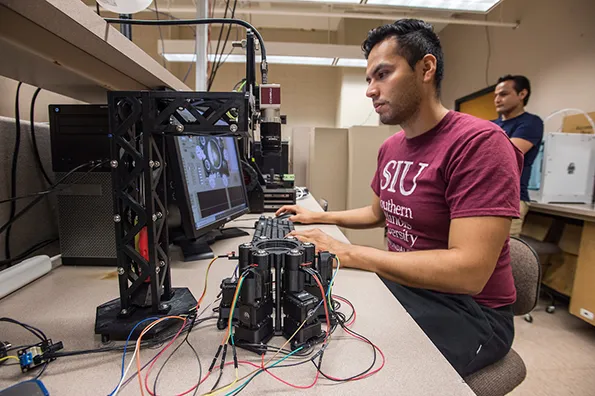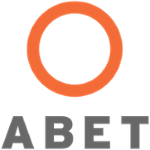Main Content
Bachelor of Science in Electrical Engineering

Our program is designed for the 21st century. You will find state-of-the-art electric equipment everywhere in the program. Our nationally-ranked program also keeps class sizes small so our nationally-recognized faculty can work side-by-side with our students in advanced teaching laboratories. Our students participate in a real-world capstone design sequence and we have optional internships, co-ops and externships in the industry that matches your career goals.
You can customize your Electrical Engineering degree by taking many technical elective courses in any of these fields. You can also specialize in power systems and energy engineering or in Medical Devices – allowing you to change the world in a variety of fields.
Degree Requirements
The Electrical Engineering degree program is accomplished by fulfilling the requirements for the Bachelor of Science degree.
- Total Degree Requirements: 126 credit hours
- University Core Curriculum: 39 credit hours
- Major Requirements: 87 credit hours
![]() Check out the undergraduate Curricular Guide, which helps you outline what courses you would want to take each semester for all four years. View all related undergraduate courses.
Check out the undergraduate Curricular Guide, which helps you outline what courses you would want to take each semester for all four years. View all related undergraduate courses.

Specializations:
- Medical Devices: Bioengineering uses the principles of engineering to solve problems involving biological material. At SIU, our students learn the skills to combine science, engineering, technology and medicine to create innovative devices, materials or processes for a diverse range of uses, but often related to improving human health.
- Power Systems and Energy: Power Engineering and Energy specialty focuses on the generation transmission and distribution of electricity, as well as the electrical devices connected to such systems, including generators motors and transformers. At SIU, our students focus on electromechanics, design and operation of large electric power and energy systems, magnetic and electric energy conversion methods, the application of electronic devices at high power levels, and alternative energy. Courses include Electric Circuits, Software Tools and Robotics, Digital Circuit Design, Electromechanical Energy Conversion, and Electrical Engineering Senior Design.
Dual Degree Opportunities
Our students have the option of enrolling in a dual major. This can help you connect with other engineers, business professionals and experts. The connections you make during your education can help you find exciting opportunities following graduation. A student may earn two different degrees (e.g., B.A. and B.S.) at the same time by having completed the requirements for each degree and a total of at least 120 semester hours.
Our students also may complete two or more majors under the same degree with a minimum of 120 semester hours, provided the student fulfills the requirements specific to each major. You will discover that a double major helps you achieve a more in-depth education by providing a deeper knowledge of two subjects without increasing the time needed to graduate. As a result, you will have broader career options and well as possibly higher eilities.arning possib
Capstone Option for Transfer Students
Our Capstone Option is available to students who have earned an Associate in Engineering Sciences (AES) degree with a minimum cumulative 2.0/4.0 GPA on all accredited coursework prior to the completion of the AES, as calculated by the transfer institution's grading policies. The Capstone Option reduces the University Core Curriculum requirements from 39 to 30 hours, therefore reducing the time to degree completion.
Career Opportunities
Employment opportunities exist within a wide range of organizations, such as computer, semiconductor, aviation, electronics, microelectronics, broadcasting, telecommunications, defense, automotive, manufacturing, electric power companies, state and federal agencies, and laboratories. Employment opportunities cover the spectrum of engineering activities, ranging from research and development to systems analysis, automation, manufacturing, customer service, support, marketing, and sales.
Research Opportunities
Enroll in our programs and you’ll work with faculty members on practical research in such fields as biomedical engineering, sensors, smart grid and cities, telecommunications, robotics, AI and machine learning, image processing, electromagnetics, and emerging devices. Our faculty members have national and international visibility in their respective fields of expertise and have obtained prestigious research grants from federal agencies such as the National Science Foundation (NSF), the National Institutes of Health, the Department of Defense, and the Department of Energy, and from high-tech industries.
Student Organizations
We encourage students to participate in our many clubs. The benefits include mentoring programs that can help with knowledge, career advice, and networking opportunities. Working one-on-one with a mentor is especially beneficial for students who struggle with the technical side of engineering. Our clubs include chapters of the American Society of Civil Engineers, the Association for Computing Machinery, and Engineers Without Borders.
Labs and Research Centers
Students enrolled in programs offered by the College of Engineering Computing, Technology, and Mathematics will find state-of-the-art research facilities in antennas and propagation, ASIC design, digital imaging, digital instrumentation, digital signal processing, electronic design and test automation, embedded systems and control, fault-tolerant design, medical imaging, mixed-signal design and test, nanoelectronics, photonics, network systems, power systems control and protection, real time embedded systems, renewable generation, RF electronics, smart grid and hybrid vehicles, telecommunications, VLSI design.
See What Our Students Say
Curious about what it’s like to be part of the Electrical Engineering program? Hear from students and graduates who have channeled their passion for innovation and technology into exciting careers. Their stories highlight hands-on learning, advanced research, and the wide range of opportunities in areas like power systems, electronics, and communication technologies.
Accreditation
Our Bachelor of Science (BS) in Electrical Engineering program is accredited by the Engineering Accreditation Commission (EAC) of ABET, under the commission’s General Criteria and the Program Criteria for Electrical, Computer, Communications, Telecommunication(s), and Similarly Named Engineering Programs.
Contact Information
Spyros Tragoudas,
Director
Engineering E-202B
1230 Lincoln Dr
Carbondale, IL 62901
618-453-7027
spyros@engr.siu.edu
Mary Fischer,
Academic Advisor
Engineering D-104
1230 Lincoln Dr
Carbondale, IL 62901
618-453-2261
cajun@siu.edu



